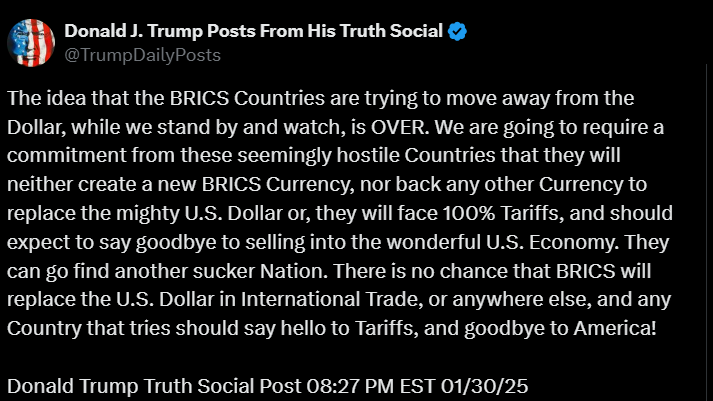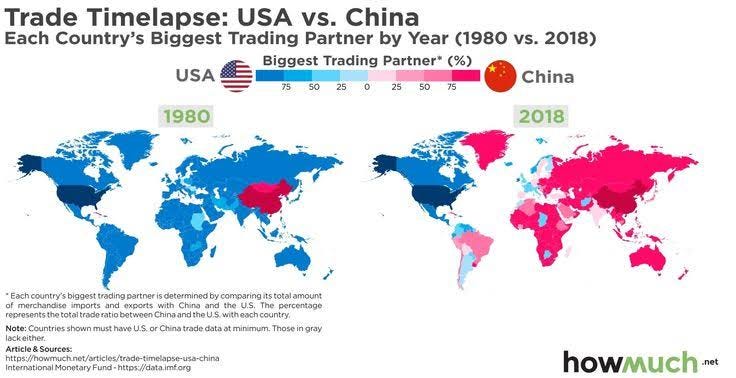Donald Trump has announced the threat of 100% tariffs on imports from BRICS countries unless they commit to the perpetual superiority of the US Dollar in international trade.
There’s nothing new about Donald Trump threatening extreme protectionist measures against other countries, in fact he’s about to shatter the USMCA trade agreement by imposing 25% tariffs on the United States’ neighbours and allies Mexico and Canada.
However the extreme threat of 100% tariffs on products from Brazil, Russia, India, China, South Africa, Egypt, Ethiopia, UAE, Iran, Indonesia, and a multitude of other BRICS aligned economies just goes to show how threatened his administration feels by any kind of transnational economic cooperation that doesn’t involve the United States.
Despite all of Trump’s assurances (lies) that the tariffs he imposes will be paid by the countries he’s trying to economically sanction, the reality is that they’ll be paid by US businesses and citizens when they purchase imported products.
Raising the price of imported goods via tariffs incentivises consumers to buy domestically produced goods and services by making them artificially cheaper, however it’s impossible to boost US output overnight, so more tariffs mean more price rises.
And 100% tariffs would mean that prices would literally double.
Take China as an example. Over the last few decades US capitalists have made fortunes by closing down domestic production and importing from China instead, where lower wages, weaker regulation, and poorer environmental standards mean much higher profit margins.
In 2023 China exported $501 billion in goods and services to the US, while the US exported $147 billion to China in return, meaning the US trade deficit with China is over $350 billion.
If Trump were to impose 100% tariffs on Chinese imports, that would end up lumbering US consumers with hundreds of $billions in extra taxes.
Then bear in mind that it wouldn’t just be China either. If you add up US imports from the BRICS member states alone (setting aside the 9 partner states and 8 more that have applied for membership), it adds up to over over $660 billion per year in imports.
It’s beyond fantastical to imagine that US companies that rely on Chinese manufacturing and $160 billion+ in imports from other BRICS member states would be either capable of, or willing to close down their overseas operations and build replacement factories in the US overnight, so prices will go up.
You can’t just expect production to shift back to the United States overnight. Neither for high tech electronic components, nor cheap mass produced consumer goods.
You can’t just slam the door shut on global supply chains and expect factories producing hundreds of $billions worth of goods to spring up in your own country overnight.
Who is going to pay for their construction? Who is going to staff them? Who is going to train up all of these new workers, especially in high tech manufacturing and services? Who is going to cover the additional costs of the required machine tools if they’re produced in countries that are subject to Trump’s sanctions? Where are the raw materials that the US cannot produce for itself in sufficient quantities (rare earth metals for example) going to come from?
Trump’s repeated threats to impose tariffs are akin to the behaviour of a local mob boss trying to bully their local community into conformity. Either everyone does as he says, and conduct business through his cartel, or they suffer reprisals and punishment beatings.
And the punishment beatings aren’t just being meted out on rival economies like China either. Trump’s economic sanctions on Mexico and Canada illustrate the fact that the new US administration is prepared to sanction and destabilise its allies, as well as geopolitical rivals.
There are quite obvious parallels between Trump’s tariffs and Brexit. Both raised trade barriers between themselves and their neighbours; both have been sold to the public with a pack of outright lies about the consequences and exaggerations of the benefits; both can be seen as self-applied sanctions with dramatic effects on domestic businesses that rely on imports and exports; and both diminish the country’s reputation and diplomatic standing by unilaterally tearing up previously agreed treaties and agreements.
Then there’s the fact that previous US attempts at protectionism have backfired spectacularly, like the embargo on the sale of advanced AI chips to China, which seemed to force the Chinese into coming up with better and more efficient AI language models, and the $1trillion implosion of US tech stocks after the release of DeepSeek-R1.
It’s vanishingly unlikely that countries that are targeted by Trump’s tariffs would just lie down and take it, without replying with tit-for-tat tariffs of their own, which would seriously damage US exports.
And seeking to bully other countries into subservience to US interests could end up being highly counter-productive to the stated aim of weakening BRICS.
If the US gains the reputation of a bully that purposefully disrupts and damages other countries economies to pursue their own agenda, or simply due to the whims of their unstable and unreliable President, doesn’t that make it more likely that countries will turn towards BRICS for stability and mutually beneficial trade, rather than against it?
Wouldn’t Trump’s trail of disruption and broken trade agreements hasten the development of a global currency "to replace the mighty U.S. Dollar" rather than dissuade it?
Take a look at how the World has changed since the beginning of the neoliberal era in 1980 when China was a trading minnow compared to the United States.
By 2018 China was already doing more trade than the United States with well over half the countries in the world.
If the United States becomes a global bully that doesn’t just destabilise China and its allies on the whims of its increasingly deranged President, but attacks its own allies and trading partners like Canada and Mexico too, doesn’t that further strengthen the Chinese?
If the US seeks to bully a country into coming over to their side of Trump’s new isolationist iron curtain with the threat of tariffs, but China is their bigger trading partner, and doesn’t resort to intimidation and threats of economic destabilisation, who are they likely to choose?
It seems that all China and BRICS need to do for now is to maintain respectful relations with their trading partners and offer a stable alternative to increasingly erratic Trumpian chaos, and they get to expand their sphere of influence by default, right?






30 comments:
Good site here. I appreciate individuals like you! I love the article, Take care!!
I read articles online very often, but I’m glad I did today. This is good! Excellent
Very well written and your blog points are great! Keep writing awesome content
Wow, superb weblog structure! The whole site is great. Im happy I found this
I just love this blog and this piece of art.
Just gorgeous and somehow nostalgic.
There is something so peaceful and loving about your art.
I have been looking for sites like this for a long time. Thank you!
Very value able post, I read the whole story when I start reading it.
I LIKE THIS WEBSITE ITS A MASTER PEACE! GLAD I FOUND THIS ON GOOGLE.
Good posts... Amazing guide and I really loved your backyard. Keep it up... MM
I enjoyed reading this articles. Very good message you've done. thankyou... MM
Thank you for sharing this amazing idea, really appreciates your post... MM
Thank you for taking the time to publish this information very useful!... MM
Thanks for sharing this type of useful articles to read, have a good day... MM
Thanks for sharing this insightful blog with us. Fairplay is a trusted online betting platform in India, offering a secure and user-friendly experience for sports betting and live casino games. It features cricket, football, Teen Patti, and more, with real-time odds and fast payouts. Enjoy generous bonuses, 24/7 support, and seamless mobile access.
UAE Air Freight Forwarder. Specialist in China Imports/Exports. Customs Clearance. Fast & Reliable International Cargo Services. Get Free Quote! Air Freight Shipping, AirBuzz Dubai , AirBuzz International , Air Cargo Rates, UAE Air Cargo,Air Freight Shipping UAE,Air Freight Services Dubai,International Air Freight UAE,Domestic air freight UAE,Domestic freight forwarding UAE,Domestic air freight companies UAE
Hello Everyone
Hope you all doing well
Here we come again with Freshest Fullz
USA UK CANADA All states available
Full info with validity & guarantee
All fullz will be fresh not sold before
USA= NAME SSN DOB DL ADDRESS EMPLOYEE & ACCOUNT INFO FULLZ
UK= NAME NIN DOB DL ADDRESS SORT CODE & ACCOUNT NUMBER
CANADA= NAME SIN DOB ADDRESS MMN PHONE EMAIL
DL Scans & DL photos front back with selfie
High Credit Scores pros 700+ scores
Business EIN company fullz
B2B B2C Email USA UK CANADA
Contact us Here & don't forget to visit our TG channel
>TG - @ killhacks Or @ leadsupplier
>What's App - (+1) 727.. 788.. 612..9
>TG Channel - t.me/ leadsproviderworldwide
>VK Messenger ID - @ leadsupplier
>E-mail - gilberthong04 at gmail dot com
CC with CVV FULLZ with billing address
Passport Scans front back with selfie
Sweep Stakes & Loan Leads
Dumps with Pin Track 101 & 202
W-2 Forms with DL
Bank Statements & Utility Bills
Children Fullz 2011-2023
Old & young Age fullz (1955-2009)
Dead Fullz
KYC Stuff
SSN & EIN Look-up
Bulk Quantity SSN Fullz
EMAIL Leads (Crypto|Casino|Business|Company|Payday|Mortgage)
SMTP|RDP|C-PANELS
Web-Mailers|Alexus Mailer
Bulk SMS|Email Senders
Loan Methods|Carding Methods
Tools & Tutorials
Cash Out Tutorials
I was diagnosed with Parkinson’s four years ago and struggled despite using Levodopa and other medications. Last year, I tried a herbal treatment from NaturePath Herbal Clinic, and within months, my symptoms significantly improved tremors stopped, balance returned, and I felt like myself again. It’s been life changing. If you’re facing Parkinson’s, consider their natural approach: www.naturepathherbalclinic.com.
This is really impressive! thanks for share this awesome research!
I appreciate your post thanks for sharing the information.
Very good written information.
This content is simply exciting and creative.
Appreciate it for helping out, excellent info.
Very helpful advice in this particular article! Thanks a lot for sharing!... MM
You make it Entertaining and you still take care of to keep it wise. Wonderful site... MM
I appreciate you penning this post plus the rest of the website is really good... MM
I am glad to be onee oof many visitors on this outstanding website... MM
I'm satisfied that you shared this userul info with us. Thank you, quite great post.... MM
I'm very happy I came across this during my search ffor something relating to this... MM
Post a Comment